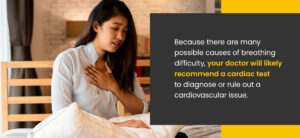
Cardiovascular disease is a prevalent issue in the United States. Over 18 million Americans have coronary artery disease, and about 805,000 heart attacks occur annually.
Cardiac testing is valuable in assessing overall heart health, diagnosing conditions and monitoring treatment strategies. It provides a wealth of data, including blood flow, heart rhythm and electrical activity.
Do you need a cardiac test? Below are 10 signs you should discuss cardiac stress testing with your health care provider.
What Is the Purpose of a Cardiac Test?
A cardiac stress test is an exam that assesses heart function and blood flow. It determines how hard your heart works during physical activity. Cardiac stress testing typically involves walking on a treadmill or pedaling on a stationary bicycle, making your heart beat progressively faster.
A doctor attaches you to an electrocardiogram to track your heart’s electrical activity. As you walk or pedal, the doctor records the following information:
- Blood pressure
- Heart rate
- Oxygen levels
- Breathing
- Electrical activity in your heart
- How hard your heart works compared to others of the same age and gender
What Can a Cardiac Stress Test Help Diagnose?
Cardiac stress tests can diagnose heart conditions or help doctors treat existing heart problems. Doctors use the test results to diagnose:
- Coronary artery disease
- Congenital heart disease
- Heart valve disorders
- Congestive heart failure
- Enlarged heart muscle
- Irregular heartbeat
A stress test can also determine if your condition is heart-related, lung-related or due to a lack of regular exercise.
Who Should Get a Cardiac Test?
You should undergo a cardiac stress test if:
- You experience chest pain, lightheadedness, shortness of breath or other heart disease symptoms.
- You have diabetes, high blood pressure or high cholesterol.
- You recently had a heart attack or heart procedure.
- You are a smoker.
- You have a family history of heart disease.
When Should You Have a Cardiac Test?
When should a doctor order a stress test? Discuss a cardiac test with your doctor if you exhibit any of the following symptoms or behaviors.
1. Chest Pain
Chest pain can signify various issues ranging from acute to severe. There are many causes of chest pain, including:
- Acid reflux
- A pulled muscle or chest injury
- Chronic heartburn
- Coronary heart disease
- A potential heart attack
- Swelling and irritation of the tissue surrounding the heart
- Inflammation of the heart wall’s middle muscular layer
- Angina
- Pulmonary artery blockage
- Pneumonia
Chest pressure can be a telltale sign of a heart problem, but it could also stem from an unrelated source, such as the lungs. Either way, it’s best to get it checked out.
Chest pain that worsens with activity can be especially concerning. It may indicate a lack of blood supply to the heart. It can also suggest a heart attack, which can be life-threatening. A cardiologist can order a cardiac test, help you pinpoint the cause of your pain and determine appropriate treatment steps from there.
2. Shortness of Breath

Breathing problems typically indicate heart or lung conditions. Some examples are:
- Pulmonary embolism
- Widening of the airways that makes the lungs more vulnerable to infection
- Fluid buildup between the chest cavity and lungs
Because there are many possible causes of breathing difficulty, your doctor will likely recommend a cardiac test to diagnose or rule out a cardiovascular issue.
3. Family History of Heart Problems
Your doctor may order cardiac testing if you have a family history of heart issues, even if you don’t show any symptoms. Some heart complications — like heart valve disease, cardiac tumors and high cholesterol — can be genetic.
If you have one or more relatives with early-onset heart disease, be sure to inform your doctor. A cardiologist can help determine your risk, order cardiac testing and recommend preventive measures.
4. Existing Conditions
Your doctor may recommend cardiac testing if you have any of the following conditions that increase your risk of heart problems:
- Diabetes
- Kidney disease
- Peripheral arterial disease
- High cholesterol
- High blood pressure
5. A Recent Heart Procedure
A cardiac stress test can help your health care provider determine a treatment course after diagnosing you with a heart condition. It can also show your doctor if and how well a previous treatment — such as medication, bypass surgery or stenting — is working.
6. Irregular Heartbeat
Tell your doctor if you experience heart palpitations or a slower-than-normal heart rate. Arrhythmia isn’t always a cause for concern, but in some cases, it can signify heart disease or other medical conditions.
7. Lightheadedness or Dizziness
Intermittent lightheadedness sometimes results from arrhythmia or CAD. A cardiologist can help you determine if a heart condition is the culprit.
8. Weakness or Fatigue
Extreme fatigue can point to heart failure. Though uncommon, it can also be a warning sign of CAD. Consult your doctor if you feel abnormally tired and run-down throughout the day. Then, they can rule out heart failure or help you get treatment before it progresses.
9. Smoking
Smoking increases plaque in the blood vessels, making it a leading risk factor for high blood pressure and heart disease. Your doctor may encourage you to get a cardiac test if you are a smoker.
10. Inactivity
Physical inactivity can increase the risk of heart attacks and cardiovascular disease. Your health care provider may want to perform a cardiac stress test if you have a sedentary lifestyle or don’t exercise regularly.
What Are the Signs of Minor Heart Blockage?
Since you can’t feel a clogged artery, it can be hard to tell when you have this issue. Many people are unaware of artery blockages until they experience an emergency like a heart attack. Here are some symptoms of heart blockage to be aware of:
- Chest pain
- Shortness of breath
- Heart palpitations
- Nausea
- Weakness
- Sweating
- Dizziness
Request an Appointment With Impression Imaging Today
Do you need a heart scan or another cardiac procedure? If so, you can find the services you need at Impression Imaging. We offer various cardiac exams.
- Treadmill stress tests: We’ll measure your heart performance as you walk on a treadmill at a gradually increasing speed.
- Nuclear stress tests: During a nuclear stress test, a technician injects radioactive dye into the vein to highlight areas of concern.
- Myocardial viability PET scans: A myocardial viability PET scan assesses heart muscle damage after a cardiac injury or condition. It uses a radioactive tracer to view the heart and measure blood supply. This test can help determine if you require a heart transplant, angiography, coronary artery bypass surgery or another procedure.
We can help you schedule a cardiac test quickly to get you the necessary treatment as soon as possible. Reach out to us to request an appointment today!



